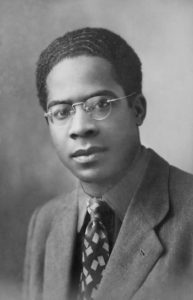
Aimé Césaire
*Aimé Césaire was born on this date in 1913. He was an Afro Caribbean, Martinican poet, playwright, and politician.
His mother was a dressmaker in the small town of Basse-Pointe, and his father was the local tax inspector. Césaire was raised in Martinique with his five siblings. Although their father was well-educated, and they shared the cultural sensibilities of the petite bourgeoisie, the Césaires nonetheless lived close to the edge of rural poverty.
Young Aimé, an intelligent 11-year-old student, was admitted to the Lycée Schoelcher in Fort-de-France. Upon graduation in 1931, he moved to Paris. He enrolled in the Lycée Louis-le-Grand to prepare for the entrance exams to the École Normale Supérieure (a high-level teachers' training college). He met several like-minded intellectuals there, including the Senegalese intellectual Léopold Sédar Senghor. They began to study African history and culture, particularly the writings of German ethnologist Leo Frobenius, whose The Voice of Africa provided a robust defense of Africa's cultural and intellectual contributions to the world.
In 1945, Césaire was elected a member of the French National Assembly from Martinique as a member of the French Communist Party. Later that year, he was elected mayor of Fort-de-France. In his book "Discourse on Colonialism," Césaire argues that the world could view the Soviet Union as an example of human progress and virtue, and an exemplar of human rights. Césaire's support of communism changed in the following years; Césaire gradually became disillusioned by the French Communist Party's perceived lack of action on race issues. In 1956, after the invasion of Hungary by the Soviet Union, Césaire announced his resignation from the French Communist Party in a letter. Two years later, he founded the Parti Progressiste Martiniquais. He retired from politics in 2001.
In 2006, he refused to meet the leader of the Union for a Popular Movement (UMP), Nicolas Sarkozy, because the UMP had voted for the February 23, 2005 law asking teachers and textbooks to "acknowledge and recognize in particular the positive role of the French presence abroad, especially in North Africa.". President Jacques Chirac finally repealed the controversial law. On April 9, 2008, Aimé Césaire, one of the most influential authors from the French-speaking Caribbean, was admitted to a hospital, where he died on April 17, 2008.
Césaire was honored by a state funeral held at the Stade de Dillon in Fort-de-France. French President Nicolas Sarkozy was present, and Pierre Aliker gave the funeral oration. Martinique's airport at Le Lamentin was renamed Martinique Aimé Césaire International Airport in January 2007. A national commemoration ceremony was held on April 6, 2011, as a plaque in Césaire's name was inaugurated in the Panthéon in Paris.